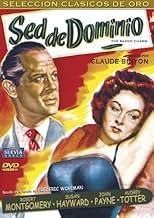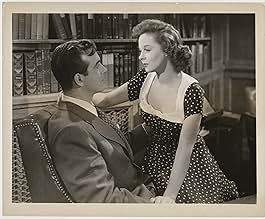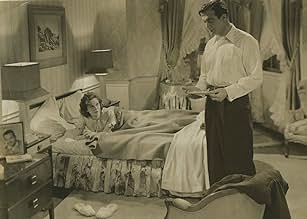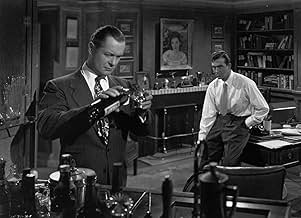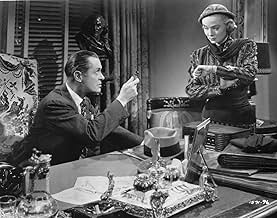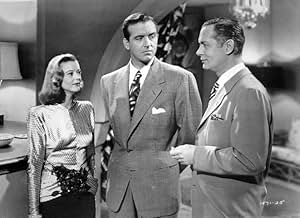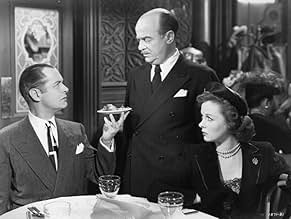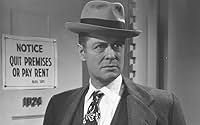In order to get his way, New York producer Matt Saxon manipulates and controls everyone around him but his latest protégé, novelist Eric Busch, finally stands-up to him.In order to get his way, New York producer Matt Saxon manipulates and controls everyone around him but his latest protégé, novelist Eric Busch, finally stands-up to him.In order to get his way, New York producer Matt Saxon manipulates and controls everyone around him but his latest protégé, novelist Eric Busch, finally stands-up to him.
- Director
- Writers
- Stars
- Awards
- 2 wins total
Harry Morgan
- Hermy
- (as Henry Morgan)
Ed Agresti
- Guest at Mexican Inn
- (uncredited)
Fay Baker
- Mrs. Noble
- (uncredited)
John Baragrey
- Peter Stanhope
- (uncredited)
Barbara Billingsley
- Mrs. Maddox
- (uncredited)
Peter Brocco
- Cyril Leatham
- (uncredited)
Laura K. Brooks
- Buxom Nurse
- (uncredited)
Robert Cabal
- Bus Boy
- (uncredited)
Barbara Challis
- Ingenue
- (uncredited)
James Conaty
- Restaurant Patron
- (uncredited)
- Director
- Writers
- All cast & crew
- Production, box office & more at IMDbPro
Featured reviews
As my wife and I sat watching "The Saxon Charm", I could see my wife getting very frustrated with the film. After all, the lead in this film (Robert Montgomery) was a thoroughly despicable and awful person...and she obviously was hating him...hating him so much she wanted me to turn off the film. Well, needless to say, I convinced her to keep watching and we both are glad we stuck with this one...as it was terribly well written and acted.
Matt Saxon (Robert Montgomery) was apparently based on a real Broadway producer, Jed Harris, and that is a big strength of the film. This is because although Saxon's behaviors and manipulations were hard to believe, it made it easier to watch the film knowing that he was not some exaggerated and unreal character! And what a character...charming but also very manipulative, cruel, selfish and without any trace whatsoever of a conscience. As a retired therapist, he was an excellent portrait of an Antisocial Personality Disorder with Borderline traits. In other words...a hellishly awful person from top to bottom!!
So how does Saxon fit into the story? Well, a successful young writer (John Payne) has decided to try writing a play and Saxon has convinced him that he is willing to put on the play. But again and again, Saxon strings him along--having him write and re-write the play...and taking him away from his young wife (Susan Hayward) and effectively destroying the marriage. Why? Mostly because Saxon is like a cat...and he needs to mouse to torment to give his sick life meaning.
The bottom line is that this is really very well written and it's among Robert Montgomery's best performances. Not always pleasant...but very captivating!
Matt Saxon (Robert Montgomery) was apparently based on a real Broadway producer, Jed Harris, and that is a big strength of the film. This is because although Saxon's behaviors and manipulations were hard to believe, it made it easier to watch the film knowing that he was not some exaggerated and unreal character! And what a character...charming but also very manipulative, cruel, selfish and without any trace whatsoever of a conscience. As a retired therapist, he was an excellent portrait of an Antisocial Personality Disorder with Borderline traits. In other words...a hellishly awful person from top to bottom!!
So how does Saxon fit into the story? Well, a successful young writer (John Payne) has decided to try writing a play and Saxon has convinced him that he is willing to put on the play. But again and again, Saxon strings him along--having him write and re-write the play...and taking him away from his young wife (Susan Hayward) and effectively destroying the marriage. Why? Mostly because Saxon is like a cat...and he needs to mouse to torment to give his sick life meaning.
The bottom line is that this is really very well written and it's among Robert Montgomery's best performances. Not always pleasant...but very captivating!
Robert Montgomery makes the film by his overwhelmingly impressive performance non-stop as an autocratic Broadway producer without any scruples at all - everyone collaborating with him become his victims, eventually ending up as suicides. It's a brilliant script above all, the dialog is intelligent and witty all the way in constant crossfire, making this more of a play than a film. Susan Hayward and Audrey Totter are the women who see him through and ultimately win over him, but not until he has lost everything. His character appears to have been a real phenomenon, the Broadway producer Jed Harris, who in the same way made his way by ruthlessly driving over everyone else and enslaving them in a leash of serfdom. John Payne is the sympathetic writer who gets caught up with him, a novelist who tries writing a play, and in their collaboration the producer's tragedy becomes visible - he could never write anything good himself, he only lived on finding others to write for him, and then he had to destroy them by over-editing their work. John Payne finally evades that ruin by the help of his wife, and the interesting thing is that his play, after being massively over-edited and flopped on Broadway, is then proved a success in its original version. So much for others trying to improve your creativity. Although Robert Montgomery makes an abominable character, the film is his, and his performance is as magnificent as the best of John Barrymore.
Other reviewers here have done a good job describing the plot and praising Montgomery's delightful performance as a scoundrel.
The other lead actors are cast unconventionally. Payne handles a realistic dramatic part very capably and believably. Hayward is very surprisingly convincing as a gentle, soft spoken wife -- showing only briefly, when appropriate, a bit of her usual strong, firey, agressive screen presence. Totter gives a fairly capable performance, though she seems miscast; her sometimes strange facial expressions and mannered body language better suited a character more edgy and dark than the one she's playing here.
I wonder how this cast ended up in this Universal International film. Payne, Hayward, Harry Morgan were all Fox contractees. Totter an MGM player. (Montgomery was freelancing by this time, and made several films released through Universal.)
The other lead actors are cast unconventionally. Payne handles a realistic dramatic part very capably and believably. Hayward is very surprisingly convincing as a gentle, soft spoken wife -- showing only briefly, when appropriate, a bit of her usual strong, firey, agressive screen presence. Totter gives a fairly capable performance, though she seems miscast; her sometimes strange facial expressions and mannered body language better suited a character more edgy and dark than the one she's playing here.
I wonder how this cast ended up in this Universal International film. Payne, Hayward, Harry Morgan were all Fox contractees. Totter an MGM player. (Montgomery was freelancing by this time, and made several films released through Universal.)
As we watch this eponymous character throw his weight around, we are not exactly inundated with any charm (or steamed cabbage). He (Robert Montgomery) is a bully, a snob, and frankly rather an odious Broadway producer. He is introduced to "Eric" (John Payne) and his wife "Janet" (Susan Hayward) when he is told that there is a script to be had. Now "Eric" is a bit green with all of this, and is soon not only rewriting pretty much everything, but his marriage is struggling and he's even bankrolling his supposed impresario (and his long suffering factotum "Hermy" (Henry Morgan). What now ensues is a nicely presented tale of being hoist by your own petard. When people start to scent blood - they combine, connive and find effective ways of exacting their revenge on their erstwhile mentor. Montgomery is actually quite convincing here, but Payne never really did set the heather on fire and we simply don't see enough of Susan Hayward - whose character is not exactly strong, anyway. It's certainly a watchable and decently paced ninety minutes that shines a bit of a light on the Machiavellian theatrical tactics of producers and their rather selfish ways, it could just have been doing with a stronger antagonist for "Saxon".
Robert Montgomery was able to break out of the mold that Hollywood and MGM pushed him into in the early 1930s - he was usually playing weaklings and society bounders. While this kept him working, he did fight to get atypical parts like Danny in NIGHT MUST FALL, the paranoid industrialist in RAGE IN HEAVEN and Prince Florizel in TROUBLE FOR TWO that demonstrated range and acting ability (not completely successful - his mad industrialist is supposed to be British, and Montgomery just can't bring up an accent to match George Sanders - here his friend and victim). By 1941 he was branching out with films like THE DUKE OF CHICAGO and HERE COMES MR. JORDAN. Unfortunately World War II broke out, and Montgomery signed up. He was out of Hollywood for three years in the Pacific, and then returned. Immediately he shared acting honors with John Wayne in THEY WERE EXPENDABLE, and then he did something interesting again: He began to direct films. THE LADY IN THE LAKE (with his "I am a camera" approach) was the first film he directed, and it became a noir classic. RIDE THE PINK HORSE followed. Then came THE SAXON CHARM.
It was different from the other two films, for it does not deal with criminals or an underside of life that most of us avoid. Instead, THE SAXON CHARM dealt with the legitimate theater. Montgomery's Matt Saxon was a successful Broadway producer who did not stop at anything to get his way. As such, he represented many Broadway performers or writers or choreographers worst nightmares, for Broadway was full of people like Saxon. Years later David Merrick would have such a reputation - brilliant producer/absolute rat. In 1946/47 the person most people would have thought of was Jed Harris. Jed Harris should not be confused with George M. Cohan's partner Sam Harris (a nicer man from most accounts - portrayed by Richard Whorf in YANKEE DOODLE DANDY). Jed Harris was a first rate heel. If you read Katherine Hepburn's memoirs ME:STORIES OF MY LIFE, Harris was the producer of her famous Broadway flop THE LAKE. Today it is recalled because it is used by Hepburn in the movie STAGEDOOR, where we hear it's dialog, beginning with "The kallallillies are in bloom again..." In 1936 it was not a laughing matter to Hepburn, who found that Harris had botched the production out of malice towards her. She had to pay him a huge sum of money to get out of her contract on the play when he took it on the road. Harris also made an enemy of Laurence Olivier, whom got his revenge in a neat way. When making up his features for RICHARD III, Olivier made his evil king look like an exaggerated Jed Harris (and most of Broadway approved).
Matt Saxon is similarly selfish, ready to turn on everyone and anyone who does not do as he says. He wrecks the home life of his playwright (John Payne) to get a play according to his specifications. He demolishes the career of his girlfriend (Audrey Totter) with rumors, although she's able to continue without him. He even turns on Harry Von Zell when that harmless fellow just makes a mild comment of disagreement to him. In the end, he destroys almost everyone - even himself. Only at the last moment does he get a bit of advice that MAY save him.
THE SAXON CHARM is not a great film about the theater, but in showing a particular type that infests it's body politic it is an interesting film on the subject.
It was different from the other two films, for it does not deal with criminals or an underside of life that most of us avoid. Instead, THE SAXON CHARM dealt with the legitimate theater. Montgomery's Matt Saxon was a successful Broadway producer who did not stop at anything to get his way. As such, he represented many Broadway performers or writers or choreographers worst nightmares, for Broadway was full of people like Saxon. Years later David Merrick would have such a reputation - brilliant producer/absolute rat. In 1946/47 the person most people would have thought of was Jed Harris. Jed Harris should not be confused with George M. Cohan's partner Sam Harris (a nicer man from most accounts - portrayed by Richard Whorf in YANKEE DOODLE DANDY). Jed Harris was a first rate heel. If you read Katherine Hepburn's memoirs ME:STORIES OF MY LIFE, Harris was the producer of her famous Broadway flop THE LAKE. Today it is recalled because it is used by Hepburn in the movie STAGEDOOR, where we hear it's dialog, beginning with "The kallallillies are in bloom again..." In 1936 it was not a laughing matter to Hepburn, who found that Harris had botched the production out of malice towards her. She had to pay him a huge sum of money to get out of her contract on the play when he took it on the road. Harris also made an enemy of Laurence Olivier, whom got his revenge in a neat way. When making up his features for RICHARD III, Olivier made his evil king look like an exaggerated Jed Harris (and most of Broadway approved).
Matt Saxon is similarly selfish, ready to turn on everyone and anyone who does not do as he says. He wrecks the home life of his playwright (John Payne) to get a play according to his specifications. He demolishes the career of his girlfriend (Audrey Totter) with rumors, although she's able to continue without him. He even turns on Harry Von Zell when that harmless fellow just makes a mild comment of disagreement to him. In the end, he destroys almost everyone - even himself. Only at the last moment does he get a bit of advice that MAY save him.
THE SAXON CHARM is not a great film about the theater, but in showing a particular type that infests it's body politic it is an interesting film on the subject.
Did you know
- TriviaRobert Montgomery patterned his portrayal of a ruthless Broadway producer who lets nothing stand in the way of getting what he wants after Jed Harris, a noted Broadway impresario who had the same reputation.
- GoofsJohn Payne and Susan Hayward are swimming. At 43:11, they swim towards Robert Montgomery's yacht. When they board, at 43:45, Robert Montgomery asks John Payne about the new third act of the play. John pats the pocket of his robe and says he has it. The robe could have been borrowed but where did the script come from? They hadn't been aboard it to this point. (Actually, Eric (Payne) is being sarcastic when he says he has it with him, even in his robe after just swimming.)
- Quotes
Matt Saxon: [Matt is coaching Alma on singing "I'm In The Mood For Love"] Has this thing got a verse?
Alma Wragg: Oh, Matt, no one sings verses anymore. That's old fashioned.
Matt Saxon: Nothing that is good and has a purpose is old fashioned.
- SoundtracksI'm in the Mood for Love
Music by Jimmy McHugh
Lyrics by Dorothy Fields
Sung by Audrey Totter (dubbed by Martha Mears (uncredited))
Details
- Release date
- Country of origin
- Language
- Also known as
- The Charming Matt Saxon
- Filming locations
- Production company
- See more company credits at IMDbPro
- Runtime
- 1h 28m(88 min)
- Color
- Aspect ratio
- 1.37 : 1
Contribute to this page
Suggest an edit or add missing content

